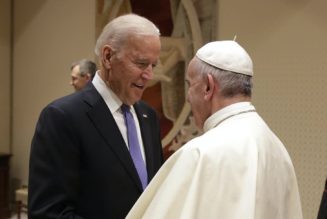It seemed to fly under the radar of both secular and most Catholic media, but recently some heartening news came out of the Diocese of Belleville, Illinois, when Bishop Michael McGovern announced that he would be selling the 13-bedroom manor that has been the home of Belleville’s shepherds for over 150 years.
In a splendid example of the Church putting its money where its mouth is, Bishop McGovern’s office said that selling the valuable property is meant to “generate resources that can be used for a maternity fund for expectant mothers as well as in support of Catholic education, youth ministry and evangelization.”
This action gives comprehensive pro-life, pro-family witness both to the People of God, and to a cynical secular world, at a time when — thanks to the recent Supreme Court decision overturning Roe v. Wade — some voices, both in and outside of the Church, have questioned whether Catholic pro-life views extend beyond the moral debate of abortion. In a press release posted to Bishop McGovern’s Facebook page, it was noted that the decision was made after much prayer and reflection and that the bishop will take up residence within the rectory of the Cathedral of St. Peter. “I hope to live more simply,” McGovern was quoted as saying, “and, as a pastor, I believe the proceeds from the sale of the home can be better used in helping pregnant mothers in need, assisting families seeking a Catholic education and providing programs for our youth.”
On social media, reactions to this announcement were uniformly positive, with some commenters calling Bishop McGovern’s decision “faith-affirming” and others hoping that other bishops might do the same.
Yes, please.
A few years ago, upon the release of the horrific, faith-shaking revelations of the Pennsylvania Grand Jury Report on sex abuse in the Catholic Church, a bishop-friend and I had a conversation touching on just this issue. We were agonizing over the terrible findings and the just anger and revulsion of so many of the faithful, who have been enduring so many terrible findings and disclosures since the start of the new millennium. “As someone in the pews,” he asked me with sincere curiosity, “what do you think we bishops can do to restore some trust, to heal where we can?”
The answer was out of my mouth before I could stop it, and surprised even me: “Depart your mansions,” I told him. “And that’s just to start.”
It was a surprising and perhaps bold response, but not wholly unprompted. In his book, “American Church: The Remarkable Rise, Meteoric Fall and Uncertain Future of Catholicism in America” (Ignatius, $12.97), Russell Shaw had astutely observed that early in the Church’s engagement with the United States, there was a point and a purpose to our bishops residing in fully staffed mansions. With Catholic immigrants arriving in unprecedented numbers — and often despised by the mostly Protestant elites who were making policy and driving economics — the construction of manor houses able to impress these movers and shakers (and thus influence local issues and legislation in ways positive to Church interests) sent several discrete but powerful messages to anyone bright enough to read the sumptuous rooms.
The first was that Catholic peasants and laborers loved their princes and wanted to see them living well, which meant authority and class issues were not immediate concerns. The second realization perhaps burned more brightly than the first: Catholic pennies had built the mansion and paid for the feast and the excellent after-dinner port. Catholic pennies had also built the cathedral next door, and the soaring stone church in the next neighborhood, and the next. Catholic pennies were paying for the granite school buildings currently under construction. Smart politicians and community leaders realized that ethnic prejudices could be worked around in the face of such a force — when so many Catholics meant so many pennies. And so many, many votes.
Shaw’s observation had stayed with me, and I blamed his book for my abrupt answer to my friend, even as I repeated it. “Sell the mansions; get out of them.” The residences had outworn their usefulness, I argued, and were now ostentatious statements of clerical excess and privilege.
My bishop friend didn’t disagree. In fact, he showed remarkable patience as I warmed to the topic and recommended using the monies to compensate abuse victims or — if such a fund already existed — to help single mothers, or pregnant women in need of shelter and education. “Scholarships for laity interested in theology or continuing adult formation, or a spiritual counseling ministry,” I had pushed. “Or, repurpose the mansions into small monastic houses — what diocese wouldn’t benefit from housing prayerful contemplatives, and everyone loves nuns! Or use the building for outreach — job training, or to create and subsidize a daycare for the elderly, because so many of us are not only raising kids while working but also tending to parents who need company and a watchful eye during the daytime!”
Truly, our bishops really do not need their mansions, even if some of their residences are used for meetings or office space. We can all work remotely, now, including bishops, and what the faithful really need (and what would really speed God’s glory and help our shepherds reestablish trust with a shaken and increasingly departing flock) is to see their bishops living simply, ideally to see them mobile and attentive. In this way, they would be like real shepherds, moving from pasture to pasture — parish to parish — living and eating (and worshiping and talking) with the people they see only at Confirmation time, unless there is an auxiliary to see to that. Imagine bishops rotating from parish to parish throughout their diocese, praying at Benediction, hearing confessions, encouraging overworked priests and discovering (perhaps for the first time since early in their ordinations) all the unknown, uncelebrated holy people residing in the pews — even (especially) the ones who return, week after week, purely for the love of Christ, and despite the sense that things have been going hopelessly wrong, for too long.
Our bishops have a fine example in their brother in Belleville. Let us hope and pray that it will be one that inspires prayer, reflection and action in every shepherd as he seeks to most effectively minister to his flock.
Elizabeth Scalia writes from New York.
Join Our Telegram Group : Salvation & Prosperity









